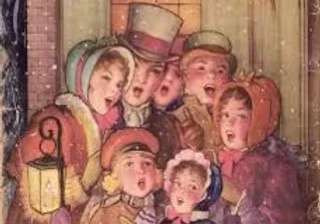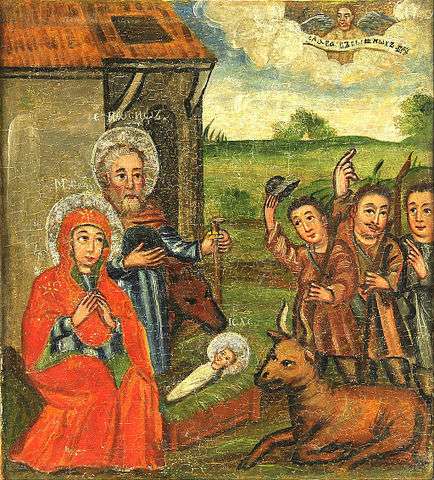Preached at St. Luke’s, Creemore, Anglican Diocese of Toronto, on the First Sunday After Christmas, 31 December, 2023. Readings: Is 61:10--62:3; Ps 148; Gal 4:4-7; Lk 2:22-40

34Then Simeon blessed them and said to his mother Mary, “This child is destined for the falling and the rising of many in Israel, and to be a sign that will be opposed 35so that the inner thoughts of many will be revealed—and a sword will pierce your own soul too.” (Luke 2:34-35)
Over my years of ministry in the Anglican Church, I’ve learned to appreciate the wisdom of the elderly faithful, saints of the church who have lived their lives trusting in the goodness and good intentions of a faithful God. Which I think is one of the reasons why I love Luke’s gospel and its account of the birth of Jesus.
Luke gives us two elderly couples, four wise and faithful people who see God’s work in the miraculous birth of Christ. In Luke’s first chapter, they are Zechariah and Elizabeth, the parents of John the Baptist. Zechariah is a priest in the Temple who is told by the angel Gabriel that his aged wife Elizabeth will conceive and bear a child, John, who will “make ready a people prepared for the Lord” (Lk 1:17).
Poor Zechariah, his only fault is that he could not bring himself to believe the angel, and so he was struck dumb until the time that his son John was born and ready to be named (Lk 1:630.
Bracketing the birth of Jesus in Luke’s account are two other old people, the prophet Simeon and another prophet, a widow named Anna. Simeon and Anna are present when Mary and Joseph bring Jesus to the temple to be circumcised according to Jewish law.
Unlike Zechariah, Simeon has no doubts as to what God is doing. Luke tells us that Simeon is “guided by the [Holy] Spirit”, and because he is granted this wisdom by God, as soon as he sees the infant Jesus he recognizes the full extent of what God is doing. Simeon praises God for letting him live long enough to see the the beginning of God’s plan of salvation, for he recognizes that this child will bring all peoples to God (Lk 2.32).
It’s wonderful to imagine Simeon’s aged face, full of wonder and joy, as he looks down into the newborn face of the child he is cradling in his arms. His words of thanks to God (Lk 2:29-32) are used in Christian liturgy as one of the great nighttime prayers, the Nunc Dimittis, used in the Anglican offices of Evening Prayer and Compline. Simeon’s prayer of praise has thus comforted countless generations of the faithful as they prepare for sleep and for death, trusting that God’s good purposes will continue to work in the world.
But Simeon goes on to say some words that did not become part of our liturgy. He makes a prediction that “This child is destined for the falling and the rising of many in Israel, and to be a sign that will be opposed 35so that the inner thoughts of many will be revealed—and a sword will pierce your own soul too” (Lk 2:34-35). What are we to make of these words?
The first, and perhaps the most important thing we can say here is that these are words of prophecy, not in the sense of a prediction of the future, though that is part of it, but in the wide sense that a godly person is speaking for God and pointing us to God’ plan. Hence the word “destined”, which in the Greek can mean “prepared” or”intended for” or “prearranged”. In other words, Simeon is announcing that this child is part of God’s plan and purpose, that this child has a destiny.
The idea of destiny is worth pausing and thinking about, because I think the idea of destiny has gone out of fashion, replaced by worldviews that see the world as random and contingent. I don’t wish to elaborate too much on this point in the time allowed for a modest homily, but as proof let me offer these lyrics from a song that you’ve no doubt heard a few times this season:
Through the years we all will be together
If the fates allow
Hang a shining star upon the highest bough
And have yourself a merry little Christmas now
These of course are words from “Have Yourself a Merry Little Christmas”, first heard in the 1944 film, Meet Me In St. Louis with Judy Garland. Perhaps a Hollywood film doesn’t bear too much scrutiny, but the phrase “if the fates allow” conjures up an ancient, pagan idea of humans subject to the arbitrary whims and chances of an arbitrary world.
There is I think a difference between the idea of “fate” as some outcome that might or might not happen but which can’t be avoided, versus “destiny” as the plan of a benign and loving God which is for our best interests. Fate is essentially random, whereas destiny is a future prepared for us by a God who has our best interests in heart. Zechariah and Simeon both recognize Jesus as the fulfilment of destiny, the Saviour whose coming was foretold by prophets such as Isaiah.
It’s also worth noting that Simeon’s revealing of God’s plan is honest in that it promises conflict and trouble as well as salvation. His words about how “This child is destined for the falling and the rising of many in Israel” echo the words of Mary’s Magnificat about how God has “brought down the powerful from their thrones, and lifted up the lowly” (Lk 1:52). Both visions of the future speak of how the Saviour will be opposed by those within Israel who have power and who claim to speak for God. Given that Simeon's words are spoken within the Temple, the centre of Jewish religion of the day, they offer no comfort to those who will claim to be upholding that religion when they sentence Jesus to death.
Likewise, Simeon’s words of how the Saviour will bring about the “rising of many” prepares us for the calling of humble fishermen and lowly tax collectors as disciples, for the healing of lepers and unclean women, for the Beatitudes and the faithfulness of a God who sees, loves, and champions the meek, humble and poor of heart.
Finally, we should note that while Simeon praises a God who will plan and work to save God’s people, he also recognizes that God’s plan is not free of pain. In telling Mary that “a sword will pierce your own soul too”, he seems to be pointing to her mother’s pain as she sees her own son’s death on the cross. (I write this on the Sixth Day of Christmas, of which the traditional carol on the joys of Mary says
The next good joy that Mary had,
It was the joy of six;
To see her own son, Jesus Christ
Upon the crucifix:)
For those of us who know the entire Christian story, the links between the birth of Jesus and his death hide everywhere in full view. The Virgin bending over the manger in Bethlehem becomes the sorrowful Pieta, holding her son’s broken body when it is lifted down from the cross. The gifts of the Magi speak of the death of a king, “sealed in the stone cold tomb”. Mary’s words tt Gabriel, “let it be with me according to your word” (Lk 1:37) echo Jesus’ words in the Garden (“not my will but yours be done” Lk 22.42).
The good news that Simeon recognizes in the infant Jesus is a promise that will be opposed by some but welcomed by the lowly ones whom God truly favours. Simeon offers no guarantee to Mary to anyone else that God will shield them from pain, but he does promise that the child is born so that, as St John promises in Revelation, tears and pain will one day be no more. In a world which many see as random and inexplicable, Simeon assures us that God’s will is loving and tbenign and God’s plan will unfold for our benefit.
As Christmas fades away and it’s joy gives way to uncertainty as to what the new year will bring, Simeon’s promises are for us to cling on to and take comfort in. For many of us who have grown old in our faith and bear our years as best we can, we may look forward to our own departing with the same peace and assurance as Simeon. But, in the time remaining to us, may we also be granted opportunity to speak our faith and our belief in God’s plan to those who follow, so that we may comfort them, as these old saints of Luke’s first two chapters have comforted us and countless others over the centuries. Amen.







